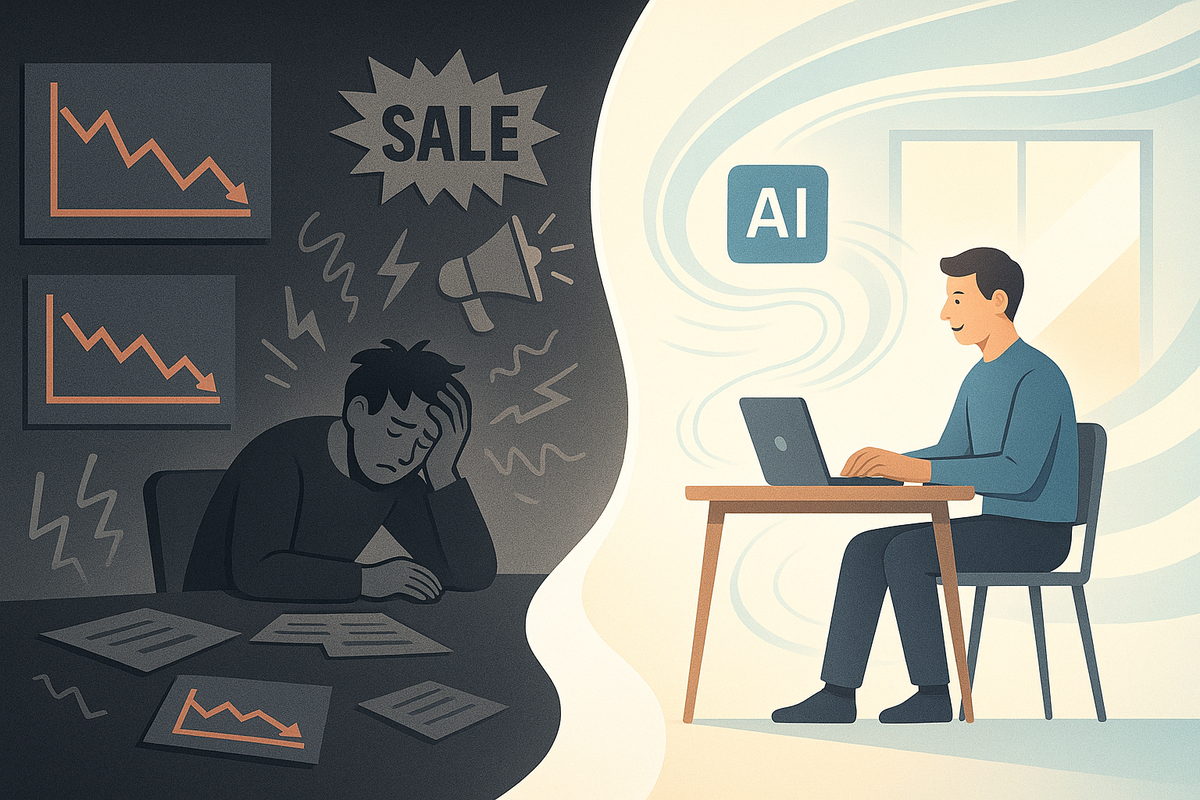Big Ideas Were a Distraction. Here’s What Actually Worked.

For years, I was hooked on the chase.
Like many first-timers to entrepreneurship, I thought success came from massive ideas—the kind that would go viral, grab headlines, or overwhelm inboxes with demand. I had my sights set on becoming the next high-performing sales machine or a solo stock-trading genius pulling five figures before lunch.
I burned out.
The False Promises of Extremes
Early on, I chased sales with everything I had.
It made sense—sales felt like a meritocracy: sell well, work hard, earn big. I tried to become the best. I consumed every tactic, poured energy into scripts and closes. But I was draining faster than I could recover.
Then came COVID—and the pivot to stock trading. It was the opposite: solo, cerebral—like playing chess alone in a cave. Perfect for my introverted side. I thought I could discipline my way into massive wealth. But that too was a mirage.
The truth? Both paths pulled me too far into roles that weren't fully me. One shouted over my inner voice. The other silenced it completely.
I bought into the idea that success had to look like those hyper-edited Instagram reels and startup success stories. You know, the ones where someone "makes it" after years in the trenches. But they rarely show the emotional toll. The quiet collapse that happens when you're your own harshest critic and the only one getting hurt when things fall apart.
And here's the brutal truth: when you're the only one getting hurt, it's easier to quit.
Maybe that makes me weak. Or maybe it just makes me human.
When Smaller Started to Feel Better
I didn't plan it—but when luck met preparation, something clicked. I had spent years developing various skills, and one day in a consulting gig, it all just... fit. I wasn't chasing anything viral. I wasn't optimizing for grandiosity. I was simply executing.
Execution. That became my niche.
I discovered that what I'm really good at—and energized by—is bringing ideas to life. Fast. With clarity. With systems. I work with teams, integrate AI, build frameworks. I flex my extroverted side when managing relationships, but also tap into my introverted core when designing complex automations. It's the first time my internal dualities didn't feel at war. Instead, they were in harmony.
The Quiet Power of Simplicity
I knew I was onto something when I noticed I wasn't tired anymore. Not the soul-deep fatigue from sales or trading. I was doing 12–14 hour days and feeling…invigorated. There's a kind of fatigue that tells you you're misaligned. This wasn't that. This was flow.
And that's when I realized something foundational: small is sustainable. When your work is aligned with how you're built, effort becomes fuel, not friction.
When you're small and specific, you become reliable. You become the undisputed authority in your tiny corner of the world.
How AI Became My Accelerant
If execution was the niche, AI became the jet fuel.
AI today is one of the greatest income equalizers I've ever seen. AI is like a power tool handed to a skilled craftsperson—you can build faster, better, deeper. You don't need a computer science degree or Silicon Valley backing. If you've worked in any business and understand its systems, AI can help you:
Transform what you know into something new. Organize that knowledge into teachable, repeatable chunks. Automate the repetitive, freeing you to do more creative work.
With tools like ChatGPT, Cursor, MAKE.com, and Bolt, you can become an AI authority in your niche—not in a decade, but in a matter of months. Not by being everything to everyone, but by being something specific to someone.
The Shift from Grandiose to Granular
Here's what I had to let go of: the fantasy.
The dream of $20k days in stock trading. The seven-figure sales commissions. I had to mourn those goals, not because they were impossible, but because they weren't mine. They were visions borrowed from someone else's highlight reel. Those dreams weren't mine — they were borrowed from other people's highlight reels.
Instead, I chose a different metric for success:
Energy: Do I leave work feeling more alive than drained? Focus: Can I ignore shiny distractions because what I'm doing feels right? Time: Do I have enough freedom to travel, to think, to breathe?
That's what "clicking" feels like now. For me, that clarity has meant earning an online income that provides the funds & freedom for monthly country-hopping across Europe. But more importantly, it means I'm building something real, not just big.
What If Nothing Is Clicking for You?
If you're reading this and nothing feels right yet, I'll offer a thought that changed everything for me. It came from The Alchemist—a book that, while simple, left a lasting impression.
"When you want something, all the universe conspires in helping you to achieve it."
There's a moment when the narrator realizes he's on the right path because good omens start showing up. Green lights. Perfect timing. A quiet ease. Tiny coincidences. Helpful strangers.
I've lived that. On ten different flights in the past 5 months, I've been randomly given an entire empty row. Not once did I ask for it. And yes, that might be dumb luck—but maybe, just maybe, it's the universe's quiet nod that I'm exactly where I need to be.
So pay attention. Pay attention to what feels frictionless. What energizes you instead of drains you. Those are breadcrumbs. The path might not be flashy. It might not look like a "big idea." But if it gives you energy, if it makes you want to build and keep building—you're onto something.
And when it clicks, you'll know.